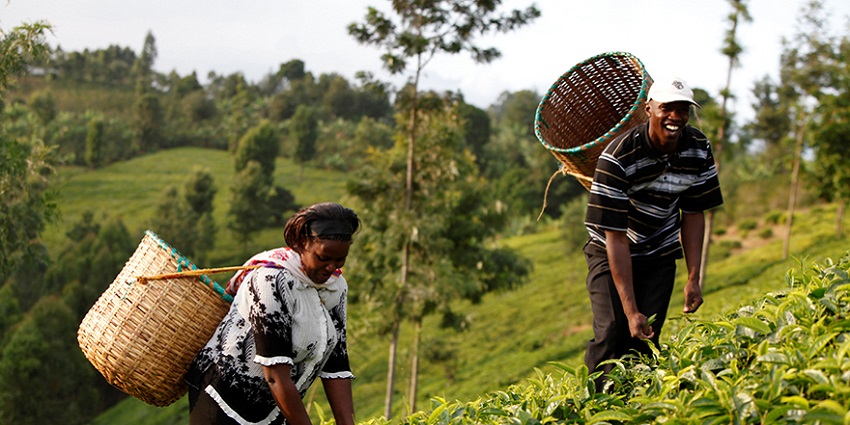6,6M€
Wallet
16 785
Number of beneficiaries
56,9 %
Women beneficiaries
85,5 %
Rural beneficiaries
Kenya
Financial services
Funding granted
Loan of €800,000*
(local currency equivalent)
Partner of the Foundation
since 2014
*Outstanding at grant value
Context :
Kenya is a middle-income country. Agriculture plays a very important role, with the livestock sector contributing nearly 10 billion US dollars to the GDP and supporting approximately 1.8 million people. The tea sector generates approximately 1.5 billion US dollars, and Kenya is the world's leading exporter of black tea.
The company:
BIMAS KENYA LTD (Bimas) is a Tier 3 microfinance institution established in 1994 by PLAN International. Its mission is to provide innovative financial and non-financial services to economically productive rural poor people to enable them to create sustainable wealth.
Impact :
BIMAS's comprehensive approach enables its clients to achieve economic growth and create sustainable rural employment, resulting in improved social well-being and incomes for Kenya's rural population. This ultimately reduces poverty and sustainably improves people's well-being.
In 2018 the Foundation invested €3.7 million in East Africa

It has thus financed two partners in Kenya: BIMAS, with a loan of 500,000 euros, and VERT Ltd. with a loan of 440,000 euros. BIMAS is a microenterprise development program (MED-P) established in 1992 under the auspices of PLAN Embu. Its objective is to contribute to sustained economic growth and employment in the rural sector, which will result in improved social well-being and increased income for the rural population in Kenya. To date, BIMAS has more than 18,500 clients, including 66.5% women. VERT Ltd., for its part, is a company specializing in the export of fresh fruits and vegetables. The company, created in 2000, has adapted its business model over the years to better meet the specificities of the European market and adapt to current legislation. It has also implemented a more sustainable model by working directly with small local farmers organized into small groups. The Foundation has been a shareholder in VERT Ltd since 2016.
The Foundation also provided its first funding to the MicroLoan Foundation in Malawi, with a €256,000 loan. The MicroLoan Foundation is a UK-based microfinance charity that provides business training, loans, and ongoing support to women living in Malawi, Zambia, and Zimbabwe. The organization's primary goals are poverty reduction and women's empowerment. In Malawi, the institution now has nearly 30,000 clients, all women. In Uganda, the Foundation provided a new €700,000 loan to the microfinance institution UMF. UMF (Uganda Microcredit Foundation) is a microfinance institution that provides loans and other microfinance services to economically active people in Uganda. The institution specializes in commercial and personal, financial, and non-financial products for businesses and individuals to facilitate their development. The institution has more than 4,000 clients, including 54% women and 70% in rural areas.
In Zambia, the Foundation also funded two partners: AMZ with a €600,000 loan over a four-year period and FINCA Zambia with a €1.2 million loan over a three-year period. Agora Microfinance Zambia (AMZ) is a microfinance institution that specifically targets low-income individuals with appropriate financial products. AMZ aims to serve clients who were previously excluded from the formal financial market, primarily due to their poverty or place of residence. It has over 25,000 clients in 391 rural areas. 611 of these clients are women. FINCA Zambia, for its part, is a multi-service microfinance institution that currently serves over 9,000 clients with financial services, including loans, savings, payments, and money transfers. FINCA Zambia's clientele includes 571 women.
The Foundation makes two new investments in sub-Saharan Africa

The Grameen Crédit Agricole Foundation is continuing its investments in sub-Saharan Africa, its priority area of intervention, with two new investments, including one with a new partner.
In Mali, the Foundation financed Baobab Mali (formerly Microcred), a Baobab Group entity, for the first time with a local currency loan equivalent to €2.5 million. Baobab Mali began its operational activities in 2013 in Bamako. It is a microfinance institution created at the initiative of a group of international partners eager to contribute to Mali's economic and social development. To qualify for loans, entrepreneurs must demonstrate one year of activity and six months of uninterrupted operations on their premises. To date, the institution has nearly 20,000 clients, including 46,000 women and approximately 35,000 clients in rural areas.
The Foundation also granted a new loan of €790,000 equivalent in local currency to the microfinance institution Bimas in Kenya. A partner of the Foundation since 2014, Bimas is a microenterprise development program (MED-P) established in 1992 under the auspices of PLAN Embu. Its objective was to provide training and credit to small businesses in the Gachoka sector of Mbeere district. The institution has continued to expand its activities targeting the unbanked population in the Embu region in order to contribute to sustained economic growth and employment in the rural sector, which will result in improved social well-being and increased income for the rural population in Kenya. To date, the institution has nearly 19,000 clients, including 65% women and 90% rural clients.
